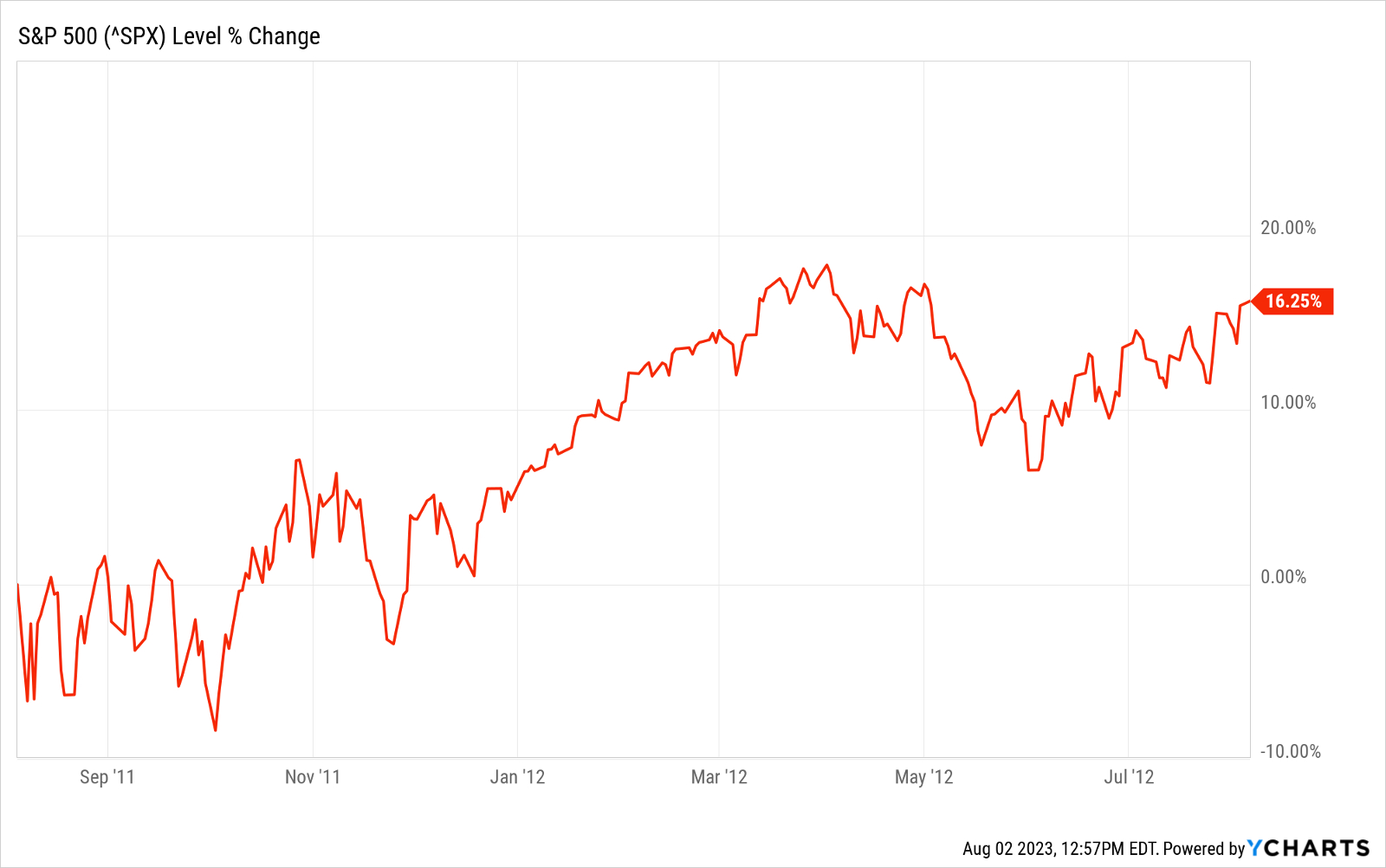Why Investors Needn't Worry About U.S. Credit Downgrade
The United States saw its credit rating downgraded for just the second time in history, but experts aren't worried about the long-term damage to stocks.


Profit and prosper with the best of Kiplinger's advice on investing, taxes, retirement, personal finance and much more. Delivered daily. Enter your email in the box and click Sign Me Up.
You are now subscribed
Your newsletter sign-up was successful
Want to add more newsletters?

Delivered daily
Kiplinger Today
Profit and prosper with the best of Kiplinger's advice on investing, taxes, retirement, personal finance and much more delivered daily. Smart money moves start here.

Sent five days a week
Kiplinger A Step Ahead
Get practical help to make better financial decisions in your everyday life, from spending to savings on top deals.

Delivered daily
Kiplinger Closing Bell
Get today's biggest financial and investing headlines delivered to your inbox every day the U.S. stock market is open.

Sent twice a week
Kiplinger Adviser Intel
Financial pros across the country share best practices and fresh tactics to preserve and grow your wealth.

Delivered weekly
Kiplinger Tax Tips
Trim your federal and state tax bills with practical tax-planning and tax-cutting strategies.

Sent twice a week
Kiplinger Retirement Tips
Your twice-a-week guide to planning and enjoying a financially secure and richly rewarding retirement

Sent bimonthly.
Kiplinger Adviser Angle
Insights for advisers, wealth managers and other financial professionals.

Sent twice a week
Kiplinger Investing Weekly
Your twice-a-week roundup of promising stocks, funds, companies and industries you should consider, ones you should avoid, and why.

Sent weekly for six weeks
Kiplinger Invest for Retirement
Your step-by-step six-part series on how to invest for retirement, from devising a successful strategy to exactly which investments to choose.
An exceedingly rare downgrade of the U.S. government's credit rating sparked a selloff in stocks Wednesday, but experts say any longer term fallout for both the equity and debt markets should be muted.
To recap: after the stock market closed Tuesday, Fitch Ratings cut the United States' long-term foreign-currency issuer default rating by one notch to AA+ from AAA. The credit ratings agency also removed its negative rating watch on the U.S. and assigned a stable outlook in its place.
Fitch cited a "high and growing general government debt burden" and the "erosion of governance" as reasons for cutting the government's rating.
From just $107.88 $24.99 for Kiplinger Personal Finance
Become a smarter, better informed investor. Subscribe from just $107.88 $24.99, plus get up to 4 Special Issues

Sign up for Kiplinger’s Free Newsletters
Profit and prosper with the best of expert advice on investing, taxes, retirement, personal finance and more - straight to your e-mail.
Profit and prosper with the best of expert advice - straight to your e-mail.
"The repeated debt-limit political standoffs and last-minute resolutions have eroded confidence in fiscal management," Fitch said in a statement.
Fitch's downgrade represents only the second time in history that the U.S. has seen its credit-worthiness marked down. Standard & Poor's (SPCI) took the once unthinkable step of cutting the federal government's long-term credit rating back in August of 2011. S&P's move came after a prolonged fight over raising the debt ceiling put the U.S. in danger of a technical default on its financial obligations.
In that regard, Fitch, which is one of the so-called Big Three credit ratings agencies along with S&P and Moody's (MCO), is sort of late to the game, experts say.
Credit downgrade doesn't mean much
Bearish strategists wonder if the Fitch downgrade will finally break the market's feverish momentum. The Nasdaq Composite is up by more than a third on a price basis so far this year, while the broader S&P 500 has added about 18%. The blue-chip Dow Jones Industrial Average, for its part, has gained roughly 7%. Such remarkable returns are divorced from economic fundamentals, bears contend, meaning it's only a matter of time before our cyclical bull market comes to an end.
"The big news is the knock-on effect of the Fitch downgrade has exerted on the risk-on trade," writes David Rosenberg, founder and president of Rosenberg Research. "This is what it took to shake the market out of its complacency?"
Rosenberg adds that Fitch's downgrade means "any further prospect of fiscal juice for the U.S. economy is off the table."
Be that as it may, most economists and strategists are taking a more sanguine view of the situation. And there's certainly some comfort to be found in historical precedent. After all, S&P cut the federal government's credit rating a dozen years ago to no obvious long-term deleterious effect.
"The downgrade should have little direct impact on financial markets as it is unlikely there are major holders of Treasury securities who would be forced to sell based on the ratings change," writes Goldman Sachs Chief Economist Jan Hatzius. "S&P downgraded the sovereign rating in 2011, and while it had a meaningfully negative impact on sentiment, there was no apparent forced selling at that time."
Besides, the way in which federal debt is classified at the institutional investor level makes worries about forced selling overblown, the economist says.
"Because Treasury securities are such an important asset class," notes Hatzius, "most investment mandates and regulatory regimes refer to them specifically, rather than AAA-rated government debt."
Perhaps most importantly, the Fitch downgrade doesn't tell investors anything they didn't already know.
"Fitch's downgrade mainly reflects governance and medium-term fiscal challenges, but does not reflect new fiscal information," Hatzius writes.
What did stocks do last time?
Perhaps some solace can be found in looking at what stocks did the last time this happened. S&P downgraded the United States' credit rating on August 5, 2011. The broader market was volatile, trading mostly sideways for the next couple of months, until it bottomed in early October. The S&P 500 lost about 8% over that span.
Have a look at where the market stood six months after the downgrade and you'll see a much more chipper chart. The S&P 500 was up about 12% on a price basis at that point. One year after the downgrade, the market had tacked on 16%.

As for the really long view, in the nearly 12 years since the last time the U.S. caught a credit downgrade, the S&P 500 has generated an annualized total return (price change plus dividends) of 14%. That's pretty great. For context, over the past 50 years the market generated an annualized total return of less than 11%.
The bottom line is that while the Fitch ratings cut is by no means good news, it should hardly top the list of things keeping long-term retail investors up at night.
Profit and prosper with the best of Kiplinger's advice on investing, taxes, retirement, personal finance and much more. Delivered daily. Enter your email in the box and click Sign Me Up.

Dan Burrows is Kiplinger's senior investing writer, having joined the publication full time in 2016.
A long-time financial journalist, Dan is a veteran of MarketWatch, CBS MoneyWatch, SmartMoney, InvestorPlace, DailyFinance and other tier 1 national publications. He has written for The Wall Street Journal, Bloomberg and Consumer Reports and his stories have appeared in the New York Daily News, the San Jose Mercury News and Investor's Business Daily, among many other outlets. As a senior writer at AOL's DailyFinance, Dan reported market news from the floor of the New York Stock Exchange.
Once upon a time – before his days as a financial reporter and assistant financial editor at legendary fashion trade paper Women's Wear Daily – Dan worked for Spy magazine, scribbled away at Time Inc. and contributed to Maxim magazine back when lad mags were a thing. He's also written for Esquire magazine's Dubious Achievements Awards.
In his current role at Kiplinger, Dan writes about markets and macroeconomics.
Dan holds a bachelor's degree from Oberlin College and a master's degree from Columbia University.
Disclosure: Dan does not trade individual stocks or securities. He is eternally long the U.S equity market, primarily through tax-advantaged accounts.
-
 Look Out for These Gold Bar Scams as Prices Surge
Look Out for These Gold Bar Scams as Prices SurgeFraudsters impersonating government agents are convincing victims to convert savings into gold — and handing it over in courier scams costing Americans millions.
-
 How to Turn Your 401(k) Into A Real Estate Empire
How to Turn Your 401(k) Into A Real Estate EmpireTapping your 401(k) to purchase investment properties is risky, but it could deliver valuable rental income in your golden years.
-
 My First $1 Million: Retired Nuclear Plant Supervisor, 68
My First $1 Million: Retired Nuclear Plant Supervisor, 68Ever wonder how someone who's made a million dollars or more did it? Kiplinger's My First $1 Million series uncovers the answers.
-
 5 Core Stocks Every Investor Should Own in 2026 and Beyond
5 Core Stocks Every Investor Should Own in 2026 and BeyondCore stocks generate reliable and growing returns for you and your portfolio. Here are five we like for the long term.
-
 The Most Tax-Friendly States for Investing in 2025 (Hint: There Are Two)
The Most Tax-Friendly States for Investing in 2025 (Hint: There Are Two)State Taxes Living in one of these places could lower your 2025 investment taxes — especially if you invest in real estate.
-
 The Final Countdown for Retirees with Investment Income
The Final Countdown for Retirees with Investment IncomeRetirement Tax Don’t assume Social Security withholding is enough. Some retirement income may require a quarterly estimated tax payment by the September 15 deadline.
-
 Coulda, Woulda, Shoulda: Are These 5 Stocks Too Overvalued to Buy Now?
Coulda, Woulda, Shoulda: Are These 5 Stocks Too Overvalued to Buy Now?Investors worried about missing the boat on overvalued stocks need not fret. These five names, while expensive, are still seeing lots of love from analysts.
-
 Stock Market Today: Earnings and AI Send Stocks to New Highs
Stock Market Today: Earnings and AI Send Stocks to New HighsA massive investment in artificial intelligence and upbeat earnings pushed equities to record levels.
-
 Income-Investing Picks for a Recession
Income-Investing Picks for a RecessionInvesting for Income Some consequences of an economic downturn work to the benefit of fixed-income investors. Here are three fund ideas that fit the bill.
-
 Dogs of the Dow Are 2022's Best in Show
Dogs of the Dow Are 2022's Best in Showdividend stocks Some of the best investments for income investors in a volatile 2022 have come from the Dogs of the Dow.
-
 Bond Values in a Volatile Market
Bond Values in a Volatile MarketInvesting for Income While the market's instability may not be over just yet, the latter half of the year should be less daunting – and possibly more rewarding – for investors.